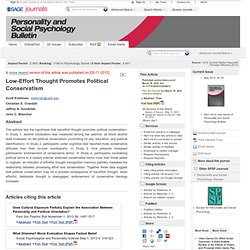

Aspie Whatnot. Psychology. 47 Mind-Blowing Psychology-Proven Facts You Should Know About Yourself. I’ve decided to start a series called 100 Things You Should Know about People.

As in: 100 things you should know if you are going to design an effective and persuasive website, web application or software application. Or maybe just 100 things that everyone should know about humans! The order that I’ll present these 100 things is going to be pretty random. So the fact that this first one is first doesn’t mean that’s it’s the most important.. just that it came to mind first.
Dr. <div class="slide-intro-bottom"><a href=" class="sl-start"> »</a></div> Cognitive Science. InFact: Conspiracy Theories. Why do so many people believe in completely improbable conspiracy theories?

Everywhere you turn these days, someone is promoting some wacky-sounding conspiracy theory. Everything from the old classics like the government shot John F. Kennedy and the government was in on 9/11, to the most far-out stories like Denver Airport is the secret headquarters of the Illuminati, and world leaders are actually reptilian aliens wearing electronic disguises.
And we'll always have the popular favorites: the medical industry conspires to keep us all sick, the food industry conspires to make us all fat, and the oil companies conspire to suppress new clean energy technologies. Conspiracy theories are so prevalent that I might have just made you mad by naming one you believe in. Why do so many people believe in some of the craziest conspiracies? The human brain evolved to keep itself alive to the best of its ability. The question we have to answer is can our intellect trump our animal instincts. Psychological ("personality") Types. Psychological ("personality") Types According to Jung's theory of Psychological Types we are all different in fundamental ways.

One's ability to process different information is limited by their particular type. These types are sixteen. People can be either Extroverts or Introverts, depending on the direction of their activity ; Thinking, Feeling, Sensing, Intuitive, according to their own information pathways; Judging or Perceiving, depending on the method in which they process received information. Extroverts vs.
Extroverts are directed towards the objective world whereas Introverts are directed towards the subjective world. Sensing vs. Sensing is an ability to deal with information on the basis of its physical qualities and its affection by other information. Thinking vs. Thinking is an ability to deal with information on the basis of its structure and its function. Perceiving vs. Perceiving types are motivated into activity by the changes in a situation.
ENTp , ISFp , ESFj , INTj , ENFj. Metacognition. OPT-010-cultural-vampirism.gif (GIF Image, 750 × 627 pixels) Low-Effort Thought Promotes Political Conservatism. The authors test the hypothesis that low-effort thought promotes political conservatism.

In Study 1, alcohol intoxication was measured among bar patrons; as blood alcohol level increased, so did political conservatism (controlling for sex, education, and political identification). In Study 2, participants under cognitive load reported more conservative attitudes than their no-load counterparts. In Study 3, time pressure increased participants’ endorsement of conservative terms. In Study 4, participants considering political terms in a cursory manner endorsed conservative terms more than those asked to cogitate; an indicator of effortful thought (recognition memory) partially mediated the relationship between processing effort and conservatism. Together these data suggest that political conservatism may be a process consequence of low-effort thought; when effortful, deliberate thought is disengaged, endorsement of conservative ideology increases.